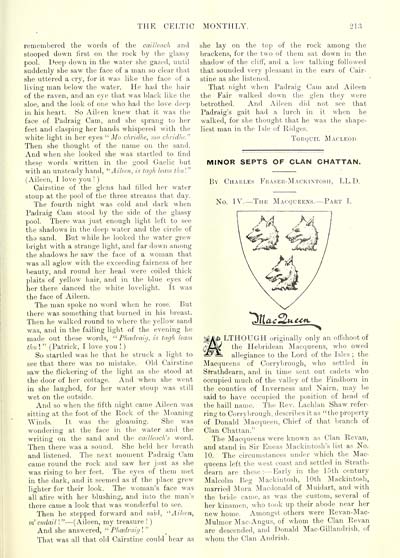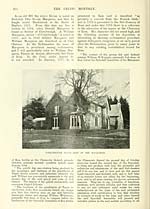Blair Collection > Celtic monthly > Volume 5, 1897
(303)
Download files
Complete book:
Individual page:
Thumbnail gallery: Grid view | List view

THE CEr.TlC MONTHLY.
213
remembered the words of the callleach and
stooped down first on the rock by the glassy
pool. l»eep down in the water she gazed, until
suddenly she saw the face of a man so clear that
she uttered a cry, for it was like the face of a
living man below the water. He had the hair
of the raven, and an eye that was black like the
sloe, and the look of one who had the love deep
in his heart. So Aileen knew that it was the
face of Padraig Cam, and she sprang to her
feet and clasping her hands whispered with the
white light in her eyes "Mo chridlie, mo c/trid/ie."
Then she thought of the name on the sand.
And when she looked she was startled to find
these words written in the good Gaelic but
with an unsteady hand, "Aileen, is tai/h learn t/niV
(Aileen, I love you ! )
Cairstine of the glens had filled her water
stoup at the pool of the three streams that day.
The fourth night was cold and dark when
Padraig Cam stood by the side of the glassy
pool. There was just enough light left to see
the shadows in the deep water and the circle of
tha sand. But while he looked the water grew
liright with a strange light, and far down among
the shadows he saw the face of a woman that
was all aglow with the exceeding fairness of her
beauty, and round her head were coiled thick
plaits of yellow hair, and in the blue eyes of
her there danced the white lovelight. It was
the face of Aileen.
The man spoke no word when he rose. But
there was something that burned in his breast.
Then he walked round to whore the yellow sand
was, and in the failing light of the evening he
made out these words, " Pliadraig, is tagh leant
thu ! " (Patrick, I love you ! )
So startled was lie that he struck a light to
see that there was no mistake. Old Cairstine
saw the flickering of the light as she stood at
the door of her cottage. And when she went
in she laughed, for her water stoup was still
wet on the outside.
And so when tlie fifth night came Aileen was
sitting at the foot of the Rock of the Moaning
Winds. It was the gloaming. She was
wondering at the face in the water and the
writing on the sand and the cailleach's word.
Then there was a sound. She held her breath
and listened. The next moment Padraig Cam
came round the rock and .saw her just as she
was rising to her feet. The eyes of them met
in the dark, and it seemed as if the place grew
lighter for their look. The woman's face was
all afire with her blushing, and into the man's
there came a look that was wonderful to see.
Then he stepped forward and said, ''Aileen,
m' eudail ! " — (Aileen, my treasure ! )
And she answered, " Phadraiij ! "
That was all that old Cairstine could hear as
she lay on the top of the rock among the
brackens, for the two of them sat down in the
shadow of the cliff, and a low talking followed
that sounded very pleasant in the ears of Cair-
stine as she listened.
That night when Padraig Cam and Aileen
the Fair walked down the glen they were
betrothed. And Aileen did not see that
Padraig's gait had a lurch in it when he
walked, for she thought that he was the shape-
liest man in the Isle of Ridges.
TORIVUIL Macleoi)
MINOR SEPTS OF CLAN CHATTAN.
By Charles Fraser-Mackintosii, LL.D.
No. IV. — TiiK Ma<'ijueen.s. — Part I.
^J^ LTHOUGH originally only an offshoot of
(Sj^d the HeViridean Macqueens, who owed
:&^M= allegiance to the Lord of the Isles ; the
Macqueens of Corrybrough, who .settled in
Slirathdearn, and in time sent out cadets who
occupied much of the valley of the Findhorn in
the counties of Inverness and Nairn, may be
said to have occupied the position of head of
the haill name. The Rev. Lachlan Shaw refer-
ring to Corrybrough, describes it as "the property
of Donald Macqueen, Chief of that branch of
Clan Chattan."
The Macqueens were known as Clan Revan,
and stand in Sir Eneas Mackintosh's list as No.
10. The circumstances under which the Mac-
queens left the west coast and settled in Strath-
dearn are these :— Early in the 1.5th century
Malcolm Beg Mackintosh, 10th Mackintosh,
married Mora Macdonald of Muidart, and with
the bride came, as was the custom, several of
her kinsmen, who took up their abode near her
new home. Amongst others were Revan-Mac-
Mulmor Mac-Angus, of whom the Clan Revan
are descended, and Donald Mac-Gillandrish. of
whom the Clan Andrish.
213
remembered the words of the callleach and
stooped down first on the rock by the glassy
pool. l»eep down in the water she gazed, until
suddenly she saw the face of a man so clear that
she uttered a cry, for it was like the face of a
living man below the water. He had the hair
of the raven, and an eye that was black like the
sloe, and the look of one who had the love deep
in his heart. So Aileen knew that it was the
face of Padraig Cam, and she sprang to her
feet and clasping her hands whispered with the
white light in her eyes "Mo chridlie, mo c/trid/ie."
Then she thought of the name on the sand.
And when she looked she was startled to find
these words written in the good Gaelic but
with an unsteady hand, "Aileen, is tai/h learn t/niV
(Aileen, I love you ! )
Cairstine of the glens had filled her water
stoup at the pool of the three streams that day.
The fourth night was cold and dark when
Padraig Cam stood by the side of the glassy
pool. There was just enough light left to see
the shadows in the deep water and the circle of
tha sand. But while he looked the water grew
liright with a strange light, and far down among
the shadows he saw the face of a woman that
was all aglow with the exceeding fairness of her
beauty, and round her head were coiled thick
plaits of yellow hair, and in the blue eyes of
her there danced the white lovelight. It was
the face of Aileen.
The man spoke no word when he rose. But
there was something that burned in his breast.
Then he walked round to whore the yellow sand
was, and in the failing light of the evening he
made out these words, " Pliadraig, is tagh leant
thu ! " (Patrick, I love you ! )
So startled was lie that he struck a light to
see that there was no mistake. Old Cairstine
saw the flickering of the light as she stood at
the door of her cottage. And when she went
in she laughed, for her water stoup was still
wet on the outside.
And so when tlie fifth night came Aileen was
sitting at the foot of the Rock of the Moaning
Winds. It was the gloaming. She was
wondering at the face in the water and the
writing on the sand and the cailleach's word.
Then there was a sound. She held her breath
and listened. The next moment Padraig Cam
came round the rock and .saw her just as she
was rising to her feet. The eyes of them met
in the dark, and it seemed as if the place grew
lighter for their look. The woman's face was
all afire with her blushing, and into the man's
there came a look that was wonderful to see.
Then he stepped forward and said, ''Aileen,
m' eudail ! " — (Aileen, my treasure ! )
And she answered, " Phadraiij ! "
That was all that old Cairstine could hear as
she lay on the top of the rock among the
brackens, for the two of them sat down in the
shadow of the cliff, and a low talking followed
that sounded very pleasant in the ears of Cair-
stine as she listened.
That night when Padraig Cam and Aileen
the Fair walked down the glen they were
betrothed. And Aileen did not see that
Padraig's gait had a lurch in it when he
walked, for she thought that he was the shape-
liest man in the Isle of Ridges.
TORIVUIL Macleoi)
MINOR SEPTS OF CLAN CHATTAN.
By Charles Fraser-Mackintosii, LL.D.
No. IV. — TiiK Ma<'ijueen.s. — Part I.
^J^ LTHOUGH originally only an offshoot of
(Sj^d the HeViridean Macqueens, who owed
:&^M= allegiance to the Lord of the Isles ; the
Macqueens of Corrybrough, who .settled in
Slirathdearn, and in time sent out cadets who
occupied much of the valley of the Findhorn in
the counties of Inverness and Nairn, may be
said to have occupied the position of head of
the haill name. The Rev. Lachlan Shaw refer-
ring to Corrybrough, describes it as "the property
of Donald Macqueen, Chief of that branch of
Clan Chattan."
The Macqueens were known as Clan Revan,
and stand in Sir Eneas Mackintosh's list as No.
10. The circumstances under which the Mac-
queens left the west coast and settled in Strath-
dearn are these :— Early in the 1.5th century
Malcolm Beg Mackintosh, 10th Mackintosh,
married Mora Macdonald of Muidart, and with
the bride came, as was the custom, several of
her kinsmen, who took up their abode near her
new home. Amongst others were Revan-Mac-
Mulmor Mac-Angus, of whom the Clan Revan
are descended, and Donald Mac-Gillandrish. of
whom the Clan Andrish.
Set display mode to: Large image | Transcription
Images and transcriptions on this page, including medium image downloads, may be used under the Creative Commons Attribution 4.0 International Licence unless otherwise stated. ![]()
| Early Gaelic Book Collections > Blair Collection > Celtic monthly > Volume 5, 1897 > (303) |
|---|
| Permanent URL | https://digital.nls.uk/75854327 |
|---|
| Shelfmark | Blair.57 |
|---|---|
| Additional NLS resources: | |
| Attribution and copyright: |
|
| Description | A selection of books from a collection of more than 500 titles, mostly on religious and literary topics. Also includes some material dealing with other Celtic languages and societies. Collection created towards the end of the 19th century by Lady Evelyn Stewart Murray. |
|---|
| Description | Selected items from five 'Special and Named Printed Collections'. Includes books in Gaelic and other Celtic languages, works about the Gaels, their languages, literature, culture and history. |
|---|

